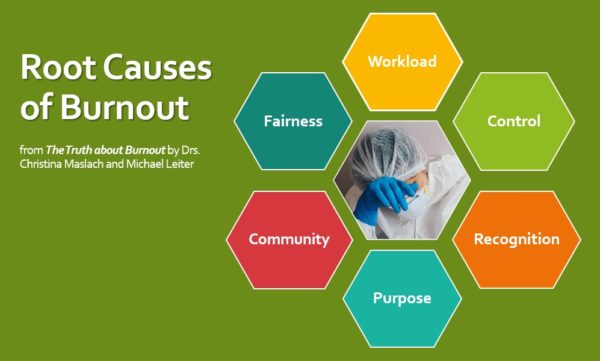When we’re conducting an Experience Snapshot to help healthcare organizations better understand ways to improve staff engagement, one of our focus group questions to frontline staff is especially revealing.
What happens to lower performers on your team?
Answers range from “someone talks to them to help them do better,” to “nothing.” More revealing than their spoken answers are their non-verbals. You can guess which answer is accompanied by eye rolling and a resigned tone.
Frontline healthcare leaders wanting to reduce turnover by finding ways to improve staff engagement may be reluctant to have frank conversations with lower performers. “I can’t afford to lose anyone right now,” is an understandable concern.

But lack of fairness in the workplace is one of the six root causes of employee burnout. When your best employees feel like not everyone is held equally accountable, that’s perceived as not fair. And, along with other factors, that perceived unfairness can contribute to a good staff member’s decision to look elsewhere.
A culture that lacks accountability affects your stars most
Lack of performance impacts the success of an entire team. But in terms of burnout and engagement, the people you want to keep most may be at highest risk. Eventually, stars can reach a point of feeling, “why should I bust my butt when others don’t contribute in the same way?” Recognizing their contributions both privately and publicly can moderate these feelings. But ultimately, holding everyone to reasonable, appropriate standards helps the team be at their best.
These four practices can help staff feel like everyone is treated equitably and fairly.
Make expectations clear.
It’s easy to be clear about the straightforward rules of the workplace: attendance, tardiness, documentation, etc. But more important are the rules about how we treat each other and the patients we serve. Connected leaders set aside time during staff meetings, huddles and rounding to talk about organizational values. They tell stories about staff members going above and beyond to serve patients/customers and their colleagues. And they share their personal aspirations and priorities about the way work gets done.
Strong leaders recognize that they share responsibility for poor individual performance within their work groups. The first step in leader accountability is setting clear expectations and goals.
Broach the subject of poor performance early.
Lynn Dull, Applied Leadership Consultant at Washington University School of Medicine, was the first person to share with me a very important leadership principle: what you permit, you promote. That philosophy was key to the establishment of a strong, accountable culture at BJC HealthCare’s Progress West Hospital, where I had the pleasure of implementing our CAREmunication® patient experience curriculum in collaboration with Lynn.
The longer you wait to talk to a lower performer about his/her deficiencies, the more you communicate to them that their actions are acceptable. More concerning is the fact that you’re sending the same message to the rest of the team.
Ask why.
Effective leaders in healthcare seek to understand the reasons behind poor performance. Opening the door to dialogue around performance may uncover structural or workforce culture issues that are inhibiting a team member from being at their best. While leaders intellectually recognize that burnout is rampant today, we sometimes hesitate to admit that it may be a primary driver behind lower performance. Dialogues that respectfully address these issues acknowledge that performance is affected by not only individual factors but also the environment in which the individual works.
Look for opportunities to reinforce positive contributions
Every individual on a work team has to feel some sense of hope that they can succeed. That’s why leaders should actually go out of their way to look for positive contributions – even though they may seem small – among staff members who are struggling. Especially important is recognizing a changed behavior that you have coached an employee to work on.
Occasionally, I’ll have a manager we’re working with admit that they just can’t find anything positive to say to an employee. Of course, that should tell you something. Effective leadership and change management theory tells us to pay attention to both the “skill” and “will” aspects of success. If employees lack in skills, we should support them in getting better. If they don’t have the will to contribute, ignore organizational values, and/or don’t respect colleagues or patients, it is time to help them move along.
Contact Us for a free consultation to help improve your employee performance and reduce burnout.
